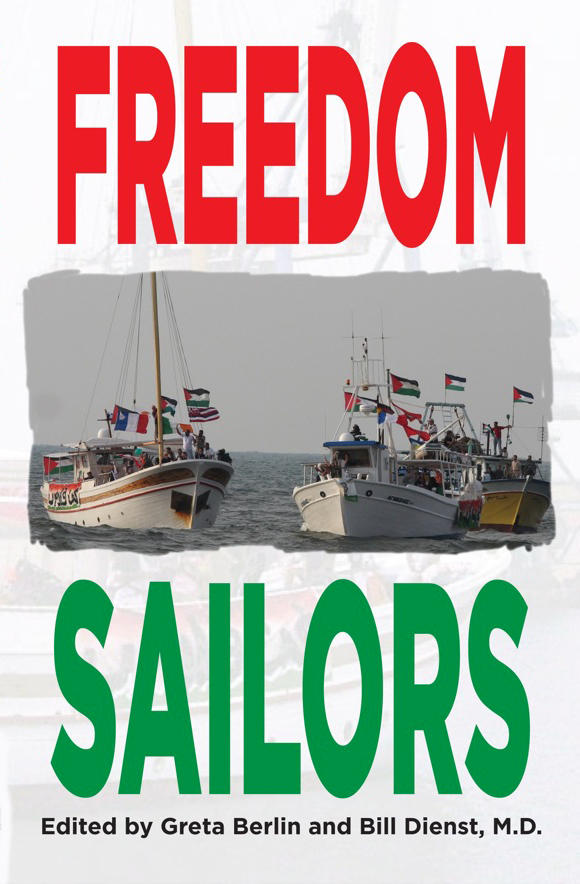Freedom Sailors defies conventional narrative and adherence to globalist media by aligning itself with a narrative resounding with internationalism. The book provides an account replete with contrasts, highlighting the many facets of history and identifying the differing dynamics between activism and foreign policy.
Despite Israel’s alleged military withdrawal from the Gaza strip, air space and territorial waters are patrolled by the Israeli military, thus ensuring a continuity of the siege. Apartheid practices have rendered Palestinians spectators of their own dependence, as foreign policy continues to ignore the illegalities of an occupying power. Sailing on board Free Gaza and Liberty, international activism brought the Palestinians’ plight to media attention, breaking the siege on Gaza for the first time and setting the scene for further humanitarian missions.
Composed of narrations from various activists involved in the planning and subsequent sailing into Gaza, the book demonstrates how activism clashed and defended itself against foreign policy aligning itself with Israeli interests. The shocking alleged suicide of Riad Hamad, an activist whose involvement in the initial stages of the project was abruptly terminated following FBI interrogations about his work in solidarity with Palestinians. Secrecy was a necessity in order to ensure a safe departure and reduce the risk of sabotage to the boats.
The boats’ arrival in Gaza, amidst great cheer from thousands of Palestinians gathered in greeting, was the first to defy a blockade which, according to international law should be denounced and challenged. Descriptions from inside Gaza by the crew portray a reality which differs greatly from the narratives of global media corporations, which veers towards security concern rhetoric instead of addressing the slow extermination of Palestinians through the occupation and its blockade. Malnutrition, inadequate medical care for Palestinians suffering from life threatening diseases which raises questions as to how patients should be treated, home demolitions and displaced Palestinians in order to build more Jewish settlements, the deprivation of food, water and fuel and the destruction of fields contribute towards what Lauren Booth describes as “the largest concentration camp in history.”
A strong depiction of reasons behind the blockade is elaborated upon in the chapter entitled “Stealing Gaza’s Gas – The Real Reason for Illegal Blockade.” Discarding the recycled ‘security concerns’ discourse, the book describes how fishermen in Gaza were forced to remain within six nautical miles of Gaza, as opposed to the 20 decided upon in the Gaza-Jericho agreement (1994). Any excursion which defied the six nautical mile was met with brutal force from Israel; some cases resulting in deaths. The discovery of natural gas off the Gaza coast enhanced the possibility for Palestinians to recuperate their economic freedom. According to David K Schermerhorn, who authored the chapter, the assaults on fishermen “had nothing to do with security or Hamas. Instead, it had everything to do with Israel controlling a four billion dollar resource belonging to Palestinians.”
Freedom Sailors also expounds upon the violence encountered in other voyages to Gaza following the Israeli Operation Cast Lead in December 2008, notably the massacre on board the Mavi Marmara in 2010. Other voyages were disrupted, with Israel hijacking the boats and detaining the activists on board, citing illegal entry into Israel whist the boats were still in international waters. The Free Gaza Movement’s commitment towards ending the siege on Gaza also led to more ambitious plans to sail boats from Gaza as a step to aid economic independence.
A compelling, poignant read, Freedom Sailors enhances the narrative of the oppressed through an internationalist perspective. It is a testimony of courage against the stagnant official procedures which rely on verbal condemnations without taking the necessary action. An account which ought to shame diplomacy and its detachment from responsibility with regard to the incessant human rights violations in Gaza.—Ramona Wadi
Ramona Wadi is a freelance writer and book reviewer. Her articles, interviews and book reviews have been published in Upside Down World, LSE Politics and Policy, Toward Freedom, and Irish Left Review.



